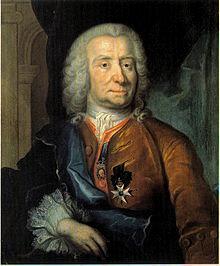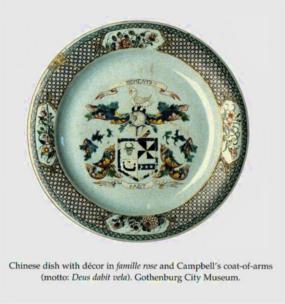Jacobites Flee to Gothenburg - after the '45
Gothenburg Always Popular with the Jacobites then ....
It's readily apparent each September 21st that the Jacobites [and the redcoats for that matter] are attracted to the Gothenburg in Prestonpans. What was less well known, until the essay of Dr. Goran Behre was drawn to our attention, was that many a Jacobite fled to Sweden's city of Gothenburg in 1746/ 1747 in the aftermath of Culloden.
The details below are from a translation provided by Jorgen Linder, who has thrice visited the Goth in Prestonpans and was until late 2010 Lord Mayor of Gothenburg. Sincere thanks to the Lord Mayor for this service to our community.
Gothenburg is a city with myriad Scottish connections - SEE SOME INDICATIONS LINKED HERE.
The First Jacobite Refugees arrive via Dundee
'One early morning in May 1746 a group of young men, with mixed feelings, boarded the James Wemyss, in Dundee harbour. They'd all followed Prince Charles Edward but after the fatal defeat on April 16th at Culloden had been fugutives from the vengeful British army. The James Wemyss carried them to Bergen in Norway.
There were thirteen in the party from the Angus Regiment, led by 20 year old Lord Ogilvy including William Campbell, Robert Fletcher, David Gardyne, James Ogilvy, Thomas Blair, Thomas & David Fotheringham, Hunter of Burnside, Alexander Johnston, Henry Patullo and Bartholomew Sandilands.
Norway was at the time under the Danish Crown and they were immediately placed in prison whilst Bergen's British Consul and the Ambassador in Copenhagen sought their extradition. The Danish authorities interviewed them on May 13th and although most of them gave false names all declared they wished to travel to Gothenburg! Their wishes prevailed and with the aid of the French Consul they travelled into Sweden arriving in Gothenburg on July 1st - but without any money which the French Consul stole from them!
More Jacobites were to follow including General Gordon of Glenbucket
In total records show that by September 1747 at least 45 Jacobites had reached Gothenburg and there received economic assistance from the French. Amongst these was General John Gordon of Glenbucket [72] who knew the Stuarts from Rome. He joined the Prince in Scotland in summer 1745 influencing many in Aberdeenshire and Banffshire to do the same. He too fled via Norway and Gothenburg and on to France in late 1747, settling in Boulogne-sur-la-mer with his wife Jean Forbes of Byondlie, where he died in 1750.
French Brigade already in Gothenburg commanded by Colonel Leslie
Gothenburg was a wise destination for the escaping Jacobites. A French Brigade had already been recruited and was ready to ship to Scotland prior to the Prince's defeat at Culloden. On June 29th 1746 Lanmary, the French Ambassador in Sweden ordered Colonel Leslie to seek to help the Prince escape from Scotland. In July Leslie arranged for money to be available for the destitute Jcobites led by Lord Ogilvy and the otehrs who came shortly afterwards. It was the widely accepted view that the sooner the refugees could get to France, out of reach of the British government, the better. They had perforce to travel overland, carefully avoiding Hanover, since the British navy commanded the seas. They travelled in small groups through Prussia accompanied by officers of the French Brigade right up till September 1747. In the latter months, a local Swedish merchant Peter Bagge, in league with Colin Campbell of the Swedish East India Company, took over responsibility after Leslie was summoned to Paris.
 
Alexander Blackwell - negotiator or traitor? ..... but Colin Campbell very much in support
During the months that Jacobite refugees were passing through Gothenburg, an agricultural scientist, Alexander Blackwell, previously honoured by Swedish King Fredrik I, purported to act as an intermediary with the British representative Walter Titley in Copenhagen to secure pardons for selective refugees in return for information on Stuart supporters. It was seemingly a foolish initiative which got nowhere since an inappropriate remark by Blackwell at the Swedish Court led to his execution for treason against the King! Nonetheless, he had by then implicated none other than John Gordon of Glenbucket, Henry Patullo and especially Laurence Oliphant of Cask. Fortunately for Oliphant, careful enquiries exonerated him and he was able to proceed to Paris.
A station on the road to Paris for most then, but a sine qua non
It is clear that many important Jacobites reached Paris and eventually rejoined the Prince there with active French support in Gothenburg. That this was possible was because [i] the city already had a substantial Scottish community willing to provide comfort; and [ii] the accident of history that meant the French Brigade committed to supporting the Prince before Culloden was stationed in the city and able to support the refugees and escort them across Prussia to Paris.
Published Date: June 23rd 2011
|





